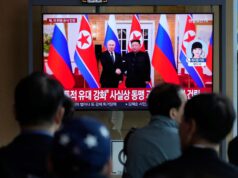Washington is seeking to create chaos globally to defend its declining hegemony

By Herman Tiu Laurel
In the wake of Philippine President Ferdinand Marcos Jr.’s state visit to China that raked in a grand harvest of trade and economic fruits, from opening billions-of -dollars-worth of durian exports for the Chinese market to a tourism rebound as millions of Chinese tourists start returning, plus $ 22.8-billions worth of investment pledge for the economic recovery of the Philippines – a difficult situation has since unfolded for President Marcos Jr. created by the visit of US Defence Secretary Lloyd Austin.
Secretary Austin was in the Philippines from January 31 to February 2 for talks about “deploying US forces and weapons in more Philippine military camps” and allegedly got four additional bases on top of the five already in operation in the south and north of the Philippines.
One of them is located in Luzon Island and another located in Palawan. The two places are close to China’s Taiwan island the Nansha Islands respectively.
President Marcos Jr. has invariably kept silent about these arrangements, while Defence and armed forces subordinates appear to be railroading developments.
These US bases inside select Filipino bases are part of the Enhanced Defence Cooperation Agreement (EDCA) automatically in force for 10-years until a one-year notice is given by either party to terminate it, and the first chance comes up in April this year. These immediate months are crucial for the Americans to convince Manila that it needs EDCA “or else.”
A Philippines-based Stratbase Albert del Rosario Institute sponsored a symposia and invited retired Rear Admiral Rommel Jude Ong to give a lecture in January.
He urged the US and Australia to “take a lead role in… ways to mitigate foreign interference,” referring to China, but forgetting that the US and Aussies are foreigners.
He pushed the countries to interfere in Philippine and Asian internal affairs, and suggests the deployment of “surface task groups” to conduct patrols in tandem with the US or other partner-navies. Retired BG Edgard A. Arevalo published a column in the Manila Times last month saying “BBM should now allow the military to join maritime drills with the US, Australia, Japan and Canada where Duterte banned the Philippine Navy from participating to ostensibly prevent offending this neighbor [China].”
The local and international media is preempting President Marcos, Jr. in deciding the matter of the EDCA agreements continuation. Whatever BBM will finally utter, the purpose of the US EDCA bases is without a doubt malicious and even evil for Asia and its current tranquility and rebounding prosperity. The following is a quote from the comment on EDCA by Center for Strategic and International Studies (CSIS) “expert” Gregory Poling reported by the US-funded online news website:
“… access to sites in northern Luzon would help US efforts to deter any Chinese move against Taiwan by putting the waters to the south of the island within range of shore-based missiles,” and “US and Philippine marines were pursuing similar capabilities with ground-based rockets, with Manila’s particular interest being to protect its South China Sea claims.”
Given the context of the times, with NATO chief Jens Stoltenberg visiting “Asian allies” after Austin, and threats of a Taiwan visit by new Republican US House Speaker Kevin McCarthy plus suspiciously timed public predictions of US Gen. Mike Minihan and Representative Michael McCaul, chairman of the US House Foreign Affairs Committee, of a US-China war in 2025, Austin’s tour and Philippine visit leaves the indelible impression that all of it is for “Project Ukraine in Asia.”
Why would the US do it? It’s clearly not because they can win a war in Asia, the US has been defeated in Asia, directly and indirectly, and US think tank the Rand Corporation has repeatedly found US defeated in its simulated war games. But what America needs today is wanton global chaos to shield itself from its impending financial and economic collapse from mounting inflation, debt and global de-dollarization. The US thinks it can escape culpability in the global chaos.
The author is founder of a Manila-based think tank Philippine BRICS Strategic Studies.




